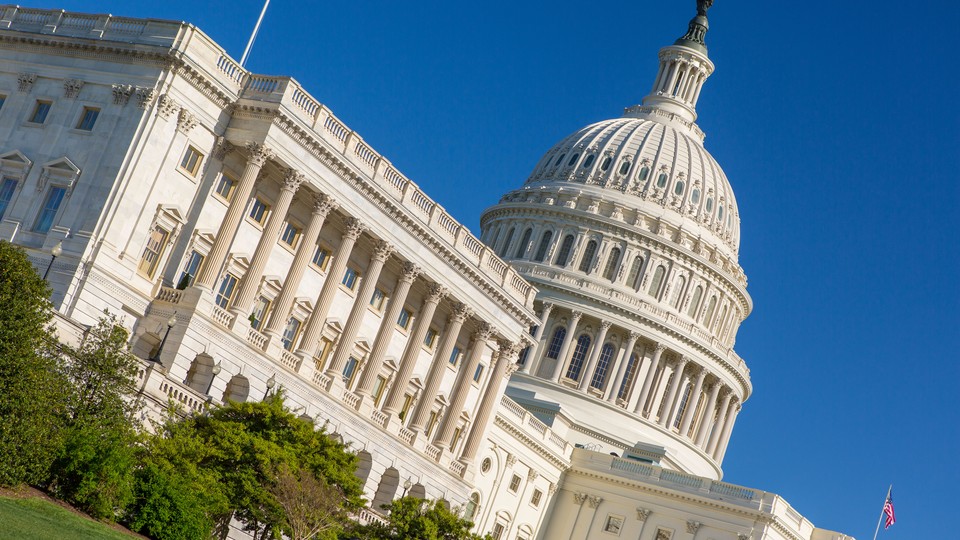Seven Senate Races to Watch
7 min read
This is an edition of The Atlantic Daily, a newsletter that guides you through the biggest stories of the day, helps you discover new ideas, and recommends the best in culture. Sign up for it here.
With Kamala Harris and Tim Walz at the top of their ticket, the Democrats are feeling much more optimistic than they were earlier this summer about holding on to the White House. But lower down on the ticket, Democrats are struggling to keep their 51–49 lead in the Senate. Senator Joe Manchin’s retirement from his seat in West Virginia is almost certain to go to a Republican next term, which means that Democrats likely need to re-elect all of their vulnerable incumbents in order to control 50 seats and retain the majority (and win the White House, given that the vice president is the tiebreaker).
As my colleague Russell Berman, who covers politics, noted to me this morning, the national “Harris effect” may not transform statewide races. As Election Day approaches, he told me, “the polls are starting to tighten and more closely resemble the presidential races in swing states.” Below is a guide to several Senate races that may be decisive—or at least interesting to watch—and what they tell us about where the parties are headed.
Montana
Montana, which went heavily for Donald Trump in 2020, could determine whether the Democrats hold on to the majority in the Senate. It’s not looking promising. Senator Jon Tester, the well-liked incumbent running against the Republican businessman Tim Sheehy, recently fell behind in the polls. In 2018, Tester won in spite of a personal campaign by Trump to push him out of office—one that involved four visits to the state to rally for his Republican challenger. In the years since Tester was first elected, in 2006, his home state, once known for political independence, has gotten redder. He is now the only statewide Democratic elected official there, and he is slipping: The Cook Political Report had considered the Montana race a toss-up over the summer but deemed it Republican-leaning earlier this month.
Ohio
In another state that has turned redder in recent years, incumbent Senator Sherrod Brown is in a true toss-up race against Bernie Moreno. Moreno, a businessman who has not held elected office, got an endorsement from Trump with J. D. Vance’s support. Earlier this month, Moreno boosted Vance’s racist lies about Haitian immigrants in Ohio. Democrats have framed him as a rich man who is primarily a friend to the rich.
Brown, meanwhile, is a longtime congressman and a self-styled champion of the working class. As my colleague George Packer wrote in a profile of Brown in 2019, “Brown’s whole career … has been a steady, if unspectacular and often losing, fight for the well-being of working people.” Even so, many of the blue-collar voters in his state have backed Trump in recent years.
Pennsylvania
In Pennsylvania, arguably the most crucial swing state in the presidential race, incumbent Senator Bob Casey is polling just ahead of Republican David McCormick. You may remember McCormick from his close primary loss to Mehmet Oz, a.k.a. Dr. Oz, in the 2022 midterms (Oz ended up losing to then–Lieutenant Governor John Fetterman). Casey, in spite of having held his office for three terms now, has described feeling like the “underdog” in the race because of all the money flowing in from Republican PACs and donors (including McCormick’s own money). The state’s Senate race is one of the most expensive in the country, with major cash flowing in from out of state. And opponents have raised questions about McCormick’s own history in Pennsylvania: Though he owns property in Pittsburgh and says he lives in-state, the Associated Press reported last fall that he appears to maintain a rented $16 million residence in Westport, Connecticut.
Arizona
After the former television anchor Kari Lake lost her gubernatorial bid in 2022, she sued officials to overturn the results. She lost that case and her appeal. Now she’s running for Senate in a state where the presidential race is currently in a dead heat. Lake is trailing her Democratic opponent, Representative Ruben Gallego, in the polls. Still, she has parlayed her fealty to Trump into a national profile that, at one point, reportedly had her in consideration to be Trump’s vice-presidential pick. Even if Lake loses her race, which seems likely, her transformation from news anchor and onetime Barack Obama donor to loyal emissary of the Trump agenda is a striking case of opportunism in the MAGA era. As Meghan McCain told my colleague Elaine Godfrey in 2022, “She is a savant at imitating Trump.”
Michigan
In another toss-up race, Democratic Representative Elissa Slotkin is facing off against Mike Rogers, who formerly served in the House. Slotkin, whose résumé includes work as a CIA analyst and as an acting assistant secretary of defense, is running to replace the retiring longtime senator Debbie Stabenow. Rogers, who has criticized Trump in the past, has since embraced the MAGA movement; Trump has in turn embraced him, offering an endorsement earlier this year. Michigan—though it went for Trump in 2016 and is now considered a true swing state—has not elected a Republican Senator since the 1990s.
Florida
Senator Rick Scott, the wealthiest member of Congress, is running as an incumbent in a tight race against challenger Debbie Mucarsel-Powell. Scott, the former Florida governor who has poured $13 million of his own money into his campaign committee since his election in 2018, has tried to become a player on the national stage, but results have been mixed.
Mucarsel-Powell, who was born in Ecuador, became the first South American immigrant elected to the House, where she served from 2019 to 2021. Now she is running in one of the two states, Florida and Texas, where Democrats are mounting bids to flip consistently red states. Her national profile is lower than Scott’s, but she may benefit from national funds: Her campaign was among the states to get an injection of funding from national Democrats’ $25 million push for voter outreach in Senate races.
Maryland
Republican former Governor Larry Hogan—whose crusade to steer his party from Trumpism back to big-tent, Reagan-style conservatism led my colleague Mark Leibovich to wonder in 2022 whether Hogan was living in a “fantasy world”—is unlikely to win a Senate seat on his home turf, at least according to current polling. His entrance into the race, which apparently had been pushed by national Republican Party members, came as a surprise to many observers: He had publicly insisted in the past that he wouldn’t seek the seat. He is running against Angela Alsobrooks, the Prince George’s County executive, in a reliably blue state that loved him as governor.
Related:
- In Kari Lake, Trumpism has found its leading lady.
- Sherrod Brown is the throwback Democrat.
Here are three new stories from The Atlantic:
- Laura Loomer is where Republicans draw the line.
- The anti–rock star
- “To understand Mississippi, I went to Spain.”
Today’s News
- The top election official in Arizona’s Maricopa County said that he would ask the state supreme court to rule on whether to bar nearly 100,000 residents from voting in state and local races, after he discovered that the state lacks documentary proof of their citizenship. Arizona Secretary of State Adrian Fontes said that the affected voters are “mostly Republican” and are likely longtime citizens who registered to vote under looser rules.
- Hezbollah accused Israel of coordinating an attack that exploded pagers used by some Hezbollah members, killing at least nine people and injuring thousands. The Israeli military declined to comment on the explosions.
- Florida Governor Ron DeSantis announced that his state’s law enforcement will conduct an independent investigation into the apparent assassination attempt on Donald Trump in West Palm Beach.
Evening Read

The Perfect Watch Costs $20
By Ross Andersen
In 1990, when I was 10, I wore a Casio watch that didn’t quite fit. The black band had no Goldilocks notch: It would either Hula-Hoop around my wrist or leave behind pink indentations. Still, the watch gave me a thrill whenever I saw the numbered seconds counting upward on its digital face, each one leaving a pale afterimage …
I recently bought a newer model that smashes together several design elements from the ’80s and ’90s into a sleek, retrofuturist package. It more or less captures the essence of the Casio that I had as a kid … Even though I rarely check the time on its face—I still instinctively tap my phone’s lock screen awake instead—it has given me more pleasure than any consumer product has in ages.
Read the full article.
More From The Atlantic
- “Dear James”: I see every tiny problem as a social injustice.
- Advice for the Gen Z techno-optimist
- The biggest change to Instagram in years
- Good on Paper: When fact-checks backfire
Culture Break

Welcome to a new era. Will smartphones be taken over by smart glasses? Snap’s new Spectacles test that theory, Caroline Mimbs Nyce writes.
Read.Health and Safety: A Breakdown, a memoir by Emily Witt, describes the writer’s headlong dive into the world of drugs and dancing to escape the madness of modern life.
Play our daily crossword.
Stephanie Bai contributed to this newsletter.
When you buy a book using a link in this newsletter, we receive a commission. Thank you for supporting The Atlantic.



